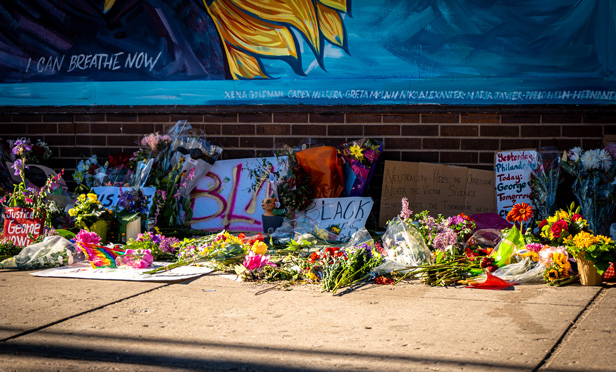
 A memorial to George Floyd in Minneapolis. (Photo: Shutterstock)
A memorial to George Floyd in Minneapolis. (Photo: Shutterstock)
To everyone who's asked me some variant of "how's it going?" over the past month, I've probably lied. Or lacked the words to articulate it fully, but I'm giving it a shot.
Obviously, my experience is just one along a continuum of black experiences, and I don't presume to speak for all black people — or even all black people at Goldman Sachs, where I have worked for six years. But the past few months have been demoralizing, and family/friends/colleagues I've spoken with and listened to across the firm and country seem to share this feeling.
Being black has been nothing if not instructive. I've learned history — and why people live where they do and why those in positions of power often don't look like me. I've learned that bad things are more likely to happen to black people solely because they're black. I learned which of my friends' parents didn't want me in the house when I was growing up in Cincinnati, Ohio, and who would be blamed if my friends broke the law.
I've learned how to prove I'm intelligent, to prove I'm not threatening, to prove I'm innocent after being assumed guilty. To prove human as this country litigates my personhood in case after case. It is as if our lives are expendable but we could never rebuild a burned storefront. As if Martin Luther King Jr.'s nonviolent philosophy allowed him to opt out of death by white supremacy. As if the Covid-19 pandemic ravaging communities of color is an acceptable, inevitable cost, and our lives just aren't worth the points off GDP. It's a lot to process.
My family immigrated to the U.S. in 1990 from Nigeria. We were living in New Orleans while both my parents studied at Tulane University. My earliest memory in this country was the assault on Rodney King, when a group of Los Angeles police officers brutally and repeatedly beat an unarmed citizen on March 3, 1991. The officers involved lied about the attack, which was captured on film by an amateur photographer.
On March 16, 1991, Soon Ja Du, an L.A. convenience store owner, shot 15-year-old Latasha Harlins in the back of the head. Du accused Harlins of attempting to steal a $1.79 bottle of orange juice, grabbed Harlins, and then killed her as she attempted to leave the store. Harlins had the cash in hand, and the police concluded that she had intended to pay.
On Nov. 15, 1991, a jury found Du guilty of voluntary manslaughter and recommended the maximum sentence of 16 years' jail time. The trial judge overruled the jury recommendation, stating that Du behaved "inappropriately" but understandably. Du was instead sentenced to five years' probation, 400 hours of community service and a $500 fine.
At the end of April 1992, an appeals court upheld the Du sentencing decision and, separately, a jury acquitted all four officers in the King case. That combination kicked off six days of protests, which resulted in 63 deaths — 10 due to shootings by law enforcement — eclipsing the toll in the city's Watts protests of 1965.
At the time, I remember seeing the video and footage from the protests, and hearing Rodney King's famous "can we all get along?" statement repeated over and over.
Then, as now, the central issue was violence against people of color with seeming impunity.
A decade later, in April 2001, while I was living in Cincinnati where my parents were both teachers at Xavier University, 19-year old Timothy Thomas was killed by a Cincinnati patrolman during a police pursuit. Officers were looking to arrest Thomas for traffic violations and other minor offenses, and he was shot point-blank by one of them. The officer claimed he believed that Thomas was reaching for a gun, although subsequent investigations determined that he was likely adjusting his pants.
As is common in these cases, Thomas's life and death hinged on an officer's distinction between being uncomfortable and being afraid. And like many of these cases, the officer's claimed belief of bodily danger legitimized the use of deadly force. I always did well in school, and this lesson was clear: Peoples' fear of me as a black male could be fatal.
The protests after Thomas's death lasted five days and centered around Cincinnati's Over-the-Rhine district, which was a predominantly black, heavily policed community where the shooting took place. The median household income in Over-the-Rhine was about $8,600 at the time (the community has since become whiter and wealthier through gentrification).
Thomas's murder also kicked off a local debate sometimes described as "respectability politics," with some black leaders blaming black culture for Thomas's death and advocating behavioral changes. The issue was not the extrajudicial killing of a U.S. citizen for "driving without a license" citations; it was a lack of respect for law and order.
If we as black people changed our behavior, pulled our pants up and were respectable, all our problems would be answered. If our parents took a firmer hand, beat us when needed, and policed our behavior, law enforcement officials wouldn't have to. But this didn't save Amadou Diallo, for instance.
Fast forward another 10 years, to November 2011, when I was living in Chicago and working at the proprietary trading firm GETCO. As I was leaving a recreation-league dodgeball game one evening on the Near North Side, I was approached by two police officers. They asked where I was coming from, and I explained.
The officers told me that I matched the description of an individual who had reportedly stolen from a residence in the area. The description was of a black male in shorts and a T-shirt, with no other details. No color for either article of clothing, and in a city with just under one million black people, I was obviously the culprit.



